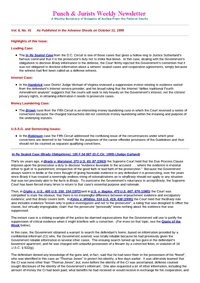Disagreeing with the Tenth Circuit, the Eighth Circuit held that the BOP's new regulations and program statement dealing with the eligibility of prisoners in a drug treatmnent program was a "manifestly permissible construction of the statute".
In this case the petitioners argued that the Bureau of Prison's (BOP) …
The defendant in this case, a member of a white supremacy group, pled guilty to the unlawful possession of an unregistered destructive device, in violation of 26 U.S.C. §§ 5861(d) and 5871. At his sentencing the district court imposed a special condition of supervised release which prohibited him from …
In this case the Court reversed an obstruction of justice enhancement under USSG § 3C1.1 for testifying falsely at trial was not justified where the judge made no independent finding of perjury but relied solely on the the PSI's conclusion.
Here, the district judge did not make an …
The Court distinguished U.S. v. Prendergast, 979 F.2d 1289 (8th Cir. 1992) and U.S. v. Bass, 121 F.3d 1218 (8th Cir. 1997), holding that in the instant case there was "specific evidence of Schave's prior alcohol abuse, including a prior diagnosis of alcoholism" upon which to base the alcohol …
The Court held that Scott had superseded the Fourth Circuit's previous ruling in U.S. v. Workman, 585 F.2d 1205 (4th Cir. 1978) - and it noted that, even before the Supreme Court's ruling in Scott, all the other Circuits had decided that the exclusionary rule was not applicable in …
It often seems that, with each new technological advance that society makes, and with each new political imperative the Government adopts, the Fourth Amendment’s mandate that searches require probable cause suffers; and the Fourth Amendment is certainly becoming pockmarked with a broad and growing list of exceptions the Government …
Thirty six years ago, in Brady v. Maryland, 373 U.S. 83, 87 (1963), the Supreme Court held that the Due Process Clause imposes upon the prosecution a duty to disclose “evidence favorable to the accused . . . where the evidence is material either to guilt or to punishment, …
Famous quote from Justice Sutherland in Berger v. United States, 295 U.S. 78, 88 (1934) regarding the duty of prosecutors to refrain from striking foul blows in their pursuit of convictions.
QUOTE OF THE WEEK - The duty of prosecutors to refrain from striking foul blows.
"The United …
In this case, the petitioners argued that the procedural scheme of their continued detention awaiting deportation as it now exists is structurally biased against meaningful review of petitioners' individual circumstances and therefore violates their procedural due process rights. "Due to political and community pressure, the INS, an executive agency, …
This decision, which was subsequently reversed at 181 F.3d 826, affirmed a prior ruling that the testimony of a key Government witness was properly barred due to the Government's delay in disclosing the identity of that witness.
This is a rare case in which the Court held that the district court erred in sentencing the defendant as a career offender under U.S.S.G. §§ 4B1.1 and 4A1.2, which nearly doubled his sentence. The Court’s rationale was that two prior convictions, which were treated as separate convictions, should …
This is a significant money-laundering case because we believe it shows a growing judicial dissatisfaction with the Government’s practice of attempting to use the Federal money laundering statutes to prosecute every garden-variety type of fraud, in large part because they carry more severe sentencing penalties. In this case, the …
The Court stated: "It is clear from the plea colloquy that the district court did not ask Robinson whether he had read the written plea agreement and understood it. More importantly, the district court did not warn Robinson that he was waiving his right to appeal. Although the Government …
Here the Court held that a defendant, who had received a maximum two-year term of imprisonment following revocation of supervised release, could not in addition be sentenced to a new term of supervised release under 18 USC § 3583(h).
The Court stated: "In light of Richardson v. U.S., 526 U.S. 813 (1999)], the government concedes that the district court erred by failing to instruct the jurors that the 'violations' are themselves elements of the CCE offense and that they therefore must agree unanimously about which three (or more) …
In this case, after the state court denied him any relief, the petitioner sought habeas relief in the Federal courts, arguing that the state court had denied him his due process rights by denying him the opportunity, established in Simmons v. South Carolina, 512 U.S. 154 (1994), to tell …
